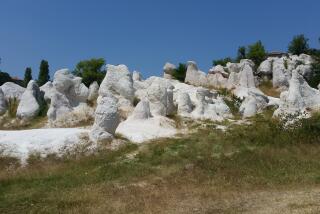DISCOVERIES
- Share via
OH, to be surprised by words, delighted by language; to feel again that reading is a lot like eating a big, juicy nectarine. To scratch one’s head, a little puzzled, and that’s OK. To realize that something important, worth knowing, will rest in one’s mind, coiled in the shape of the words. To put the book down and feel like writing, the way some paintings make you feel like painting, instead of shutting you out, enforcing the boundaries of genius or forcing awe. To be reminded, also, that so many writers write in relative obscurity; the point, as students of Emily Dickinson will remind us, is not always to be published.
All of which leads to the thrill of true discovery -- a little possessive, a little exclusive at first, but followed shortly by the urge to yell: “Look here! Over here!”
Brita Bergland was born in Urbana, Ill., in 1954. She has written two collections of poems, “The Poet at Its Desk,” in 1988, and “The Rebirth of the Older Child,” in 1993. Both bring a reader back to the days of ebullience, before poetry’s Age of Austerity, before irony poked its bony fingers into the forgotten corners of the published word, having already clawed its way through fiction, memoir and even nonfiction.
Bergland’s poems are full of wordplay and sound play: “empty igloo,” “windy bible,” “poltergeist of privilege,” “quince eye” and “anathema marantha” are just a few examples. In “The Rebirth of the Older Child,” the poet writes about the myths of masculinity and femininity: “The female rib is the rural nib,” “Man a poled being,” “He turned off her brook and flowers.” Many of the poems in this and the earlier collection locate the female in nature: “the glade of her mother’s hand,” “tree women in vegetable matter.”
The poems are rich in geese and stars, ice and blue fire. “Infiltrate the language skin,” she writes.
Hold your mouth to the full moon.
Take a large bite.
Some poems are peopled with children (words like “fritos” and “orange” stand out on the pages) -- both the practical side of child-rearing and the organic and emotional:
the child’s lips, vacant arms,
nettle specious.
In “Up Yonder in the Meadow of Children,” the poet announces that “the child is split / or a bridge.” But Bergland writes way beyond autobiography. She’s out on a limb, a woman in a cold climate, finding sympathy in plants and rocks and trees that endure all manner of weather.
Echoing in these pages is the exuberance and reticence of Dickinson, especially evident in such poems as “The Leek Family,” from “Rebirth”:
O radish, red in pause
breathing
in bug or out
rot, bite
a moth in wing, dust
a fine lady at home
with her doors about her.
No lowland leek
but lily
exhumed
a vein of golden ore
swamp light, quince eye.
At a casement window, zzz dream
Zee moment, fire on water,
a flood of peonies.
The world is close and on haunches
at once knee deep
dicker, decker, church architecture
one rhyme, a paws and a pause
in red root a pome hot to be bitten
deep in the earth,
a rash of radish
pea twine”
More to Read
Sign up for our Book Club newsletter
Get the latest news, events and more from the Los Angeles Times Book Club, and help us get L.A. reading and talking.
You may occasionally receive promotional content from the Los Angeles Times.









